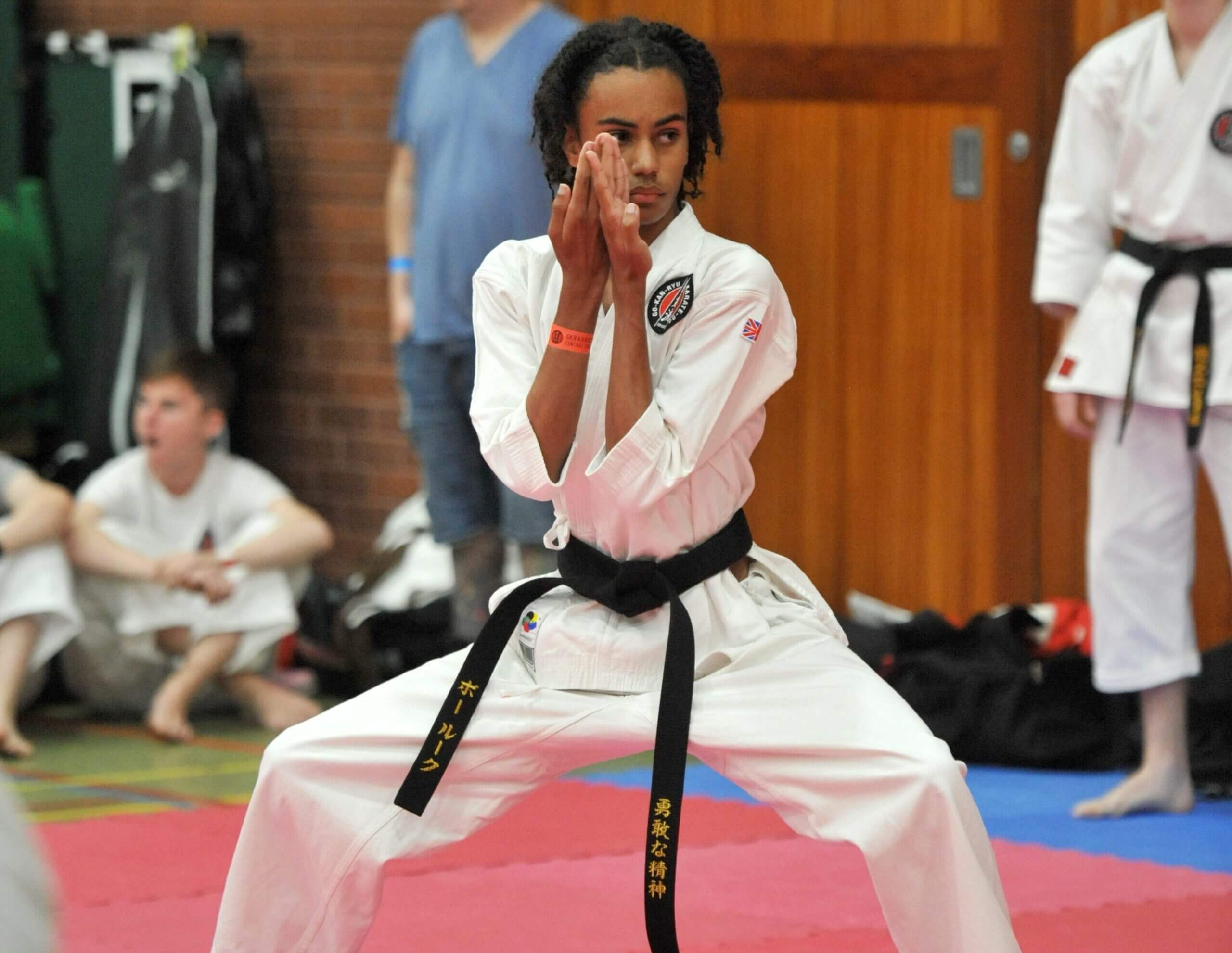Bushido: Codes for Improved Living

With the rise of feudalism in Japan, a professional warrior class emerged. These Japanese warriors functioned as guards and carried the title of ‘Bushi’ (fighting Knights). They carried with them a code of honor and loyalty that embodied a code of daily living encompassing a system of moral principles. The code was called ‘Bushi-do’ (Way of the Warrior).
- Moral standards should not just be something we read about in history books and as relevant today as they were in any period of history. As modern karate-ka, there is a lot to be learnt from these ancient warriors, and by embracing their principles we will not only become better in our art, we will become better human beings.
- The development of the ‘Bushi persona’ can be broken down into 6 key areas – character, balance, presence/power, confidence, winning spirit and respect/discipline. As the fighting Knights developed these, so can we and in the same way – through our training. As I go through each principle, although they may immediately appear purely training related, I urge you to see past this and relate it to your daily life. Only when we do this do we discover the relevance that training has to life.
Code 1: Character
Character development is pivotal in Karate and requires the most mental discipline to develop.
Achieving our goals demands immense focus and concentration, which helps us block out frustration and distractions that often try to creep into our lives. Success to great levels in life requires dedication and persistence, especially when pessimism and negativity seem to be accepted as the norm. It takes great courage to step outside of your comfort zone and go against the opinions of the majority, and resist the urge to quit when the going gets tough.
- We as karate-ka must cultivate these qualities through both physical exercise and mental practice. There are three characteristics that are important for the karate-ka to develop as a block, kick or punch. They go beyond the physical and need as much dedicated practice to develop. They are:
Fudoshin
Is a Japanese term meaning the ability to remain calm and detached, even when faced with a threat or difficulty? If you can cultivate Fudoshin, you’ll be less concerned about personal harm and risk. Since you won’t be fearful or confused, you’ll react with a clear and open mind. You’ll be able to make good decisions, instead of panicked poor decisions. Fudoshin is one expression of self-control. People who have clear calm minds will always be more successful than people who allow fear and doubt to creep in.
Heijo-Shin
One must have Fudoshin to develop Heijo-shin, which is an intense focus. A focused mind is essential to prepare for coping with any great challenge. Heijo-shin filters out all unnecessary stimulation. Developing this quality helps one to remain alert and ready, eliminating fear, surprise, and indecision. People with Heijoshin are not distracted when something doesn’t go their way. People with Heijo-shin are able to block out any distractions and single-mindedly pursue their goal perfectly.
Kokoro
Fudoshin and Heijo-Shin (self-control and focus) are necessary for tests of all kinds and are developed through visualization and physical exercise. But these mental attitudes are meaningless without heart and spirit. A karate-ka might have great talent, but without Kokoro (heart and spirit) he/she will ultimately fail. A karate-ka without heart is not a true karate-ka. A person with Kokoro will often progress further and achieve more out of life than a person with great talent but no heart. Kokoro is the manifestation of perseverance and indomitable spirit, of trying ones best at all times, no matter the odds. Kokoro comes from dedication to karate and devoted practice.
Code 2: Balance
In order to achieve the mental mindset necessary for true karate achievement, the karate-ka must learn balance. Through balance the karate-ka leans to defend as well as attack, to counter as well as initiate, to use a variety of techniques instead of relying on a few. And, it is balance in the end that helps the karate-ka put life into its proper perspective.
Understanding the concept of yin and yang’ helps the karate-ka achieve balance.
Yin-yang is the philosophy that the universe consists of conflicting and harmonious elements that depend on each other for their meaning (day and night for instance have no meaning except in their relationship to each other).
Yin symbolizes the destructive elements in the universe, while yang symbolizes the creative elements in the universe. These opposites are necessary but incomplete, having to combine to make a whole. To apply this concept to karate, you must combine the hard and the soft, the passive and the active.
Code 3: Presence/Power
One of the greatest benefits of karate training is the development of ‘Ki’ or inner energy. This is something essential for success in all aspects of life. Tapping into ’Ki’ can make you more powerful, focused, and determined. To do this, focus all of your energy on a single target, goal, or task; this requires practice and concentration.
By concentrating on the perfect execution of physical techniques, you will discipline your mind to focus, thus, when you practice saying a sidekick, you will focus on performing the perfect sidekick, without error. You will mentally visualize the perfect side-kick, imagine what it feels like, and then watch your body as you attempt to create the perfect technique. Nothing should interfere with the physical execution of the technique. Although your attempts may fall short of perfection, the mental focus you develop in the attempts is irreplaceable.
When sparring or doing kata, the karate-ka uses ‘Ki’ to keep going even when he or she is exhausted and would like to give up. This ability to focus when necessary epitomizes true karate spirit.
Code 4: Confidence
Fear, doubt, indecision, and confusion all work to defeat a person, but these problematic emotions are the result of a person’s own attitude. With dedicated karate practice, you can learn to eliminate these destructive beliefs and encourage creative, constructive beliefs and attitudes. Although sparring and kata obviously requires physical skill, success only comes if you are mentally prepared. If you’re confident when you spar or demonstrate kata, you will be more likely to move and react quickly without hesitation. If you are hesitant or unsure of yourself, you may let opportunities pass you by; this does not just only apply in the dojo.
At first, developing confidence is difficult since you aren’t sure of what you are doing. That is why practicing step sparring, timing drills and combinations are important. These drills prepare your mind and help to develop confidence. For the karate-ka confidence is paramount, because confidence is the best form of self-defence there is.
Code 5: Winning Spirit
The mental and physical skills required to succeed in karate are those same skills needed to succeed in life. Quality in behavior is the key to a winning spirit. How you act in the dojo, at home, at work, or even at school will always determine the quality of life you have by way of how we are treated either by ourselves or by our peers.
If we are disciplined students in the dojo and always demonstrate a high level of respect and etiquette by always using good manners or by treating others in a kind and caring way, but then leave the dojo and go out let our disciplines slip and act in a way that is not congruent to our behavior in the dojo, then we have really learnt nothing.
Winning spirit is to carry your dojo attitude everywhere and makes living without internal conflict possible, as you are not being two different people. Winning spirit is being true to yourself, true to others and true to your art.
Code 6: Respect/Discipline
Respect is an appreciation of a persons worth or qualities. The ‘Bushi’ understood that respect could not be gained through cohesion, i.e. being in a position of authority may have people respecting you because they have to, but this is not true respect. Respect is earned through how we act and how we treat others.
To receive respect, you first have to learn how to respect. Here are 5 ‘respect practises’ to get you started.
- One should believe in the philosophy of zones school. = Respect for the tradition.
- One should stay fit, regardless of circumstance = Respect for one’s body and mind.
- One should commit to mastering the art one has chosen = Respect for the art.
- One must be willing to participate in difficult training = Respect for discipline.
- One must do ones best at all times = Respect for ones self.
Discipline is the ability to make the right decision (not the soft one) when no one else is watching. To me discipline is one of the highest values a karate-ka can have. It demonstrates strong character because it is very hard to obtain, very easy to lose and is one of the only things you can really call your own; it is something to be proud of and deserves respect.
- Developing the codes of the Bushi, is based on having heart, refusing to become discouraged, and giving the best effort possible. With this attitude, the karate-ka can achieve beyond his or her expectations and continue to grow in their karate and in their life.
Sensei Luke Carruthers
Related Articles
The Five Animal Styles That Influenced Karate
Climbing Back Up That Mountain



